- Home
- Barbara Metzger
A Perfect Gentleman
A Perfect Gentleman Read online
Table of Contents
Copyright
A Perfect Gentleman
Dedication
Chapter One
Chapter Two
Chapter Three
Chapter Four
Chapter Five
Chapter Six
Chapter Seven
Chapter Eight
Chapter Nine
Chapter Ten
Chapter Eleven
Chapter Twelve
Chapter Thirteen
Chapter Fourteen
Chapter Fifteen
Chapter Sixteen
Chapter Seventeen
Chapter Eighteen
Chapter Nineteen
Chapter Twenty
Chapter Twenty-One
Chapter Twenty-Two
Chapter Twenty-Three
Chapter Twenty-Four
Chapter Twenty-Five
Chapter Twenty-Six
Chapter Twenty-Seven
Chapter Twenty-Eight
Chapter Twenty-Nine
Chapter Thirty
Chapter Thirty-One
A Perfect Gentleman
By Barbara Metzger
Copyright 2015 by Barbara Metzger
Cover Copyright 2015 by Untreed Reads Publishing
Cover Design by Ginny Glass
The author is hereby established as the sole holder of the copyright. Either the publisher (Untreed Reads) or author may enforce copyrights to the fullest extent.
Previously published in print, 2004.
This ebook is licensed for your personal enjoyment only. No part of this book may be reproduced in any form or by any electronic or mechanical means, including information storage and retrieval systems, without written permission from the publisher or author, except in the case of a reviewer, who may quote brief passages embodied in critical articles or in a review. If you would like to share this book with another person, please purchase an additional copy for each person you share it with. If you’re reading this book and did not purchase it, or it was not purchased for your use only, then please return to your ebook retailer and purchase your own copy. Thank you for respecting the hard work of this author.
This is a work of fiction. The characters, dialogue and events in this book are wholly fictional, and any resemblance to companies and actual persons, living or dead, is coincidental.
Also by Barbara Metzger and Untreed Reads Publishing
A Loyal Companion
A Suspicious Affair
A Worthy Wife
An Angel for the Earl
An Enchanted Affair
Cupboard Kisses
Father Christmas
Lady in Green
Lady Whilton’s Wedding
Minor Indiscretions
Miss Treadwell’s Talent
Rake’s Ransom
Saved by Scandal
The Duel
The Hourglass
Wedded Bliss
The House of Cards Trilogy
Ace of Hearts
Jack of Clubs
Queen of Diamonds
The True Love Trilogy
Truly Yours
The Scandalous Life of a True Lady
The Wicked Ways of a True Hero
Collections
An Enchanted Christmas: A Regency Collection
Autumn Glory and Other Stories
Greetings of the Season: A Regency Collection
Valentines: A Trio of Regency Love Stories for Sweethearts’ Day
www.untreedreads.com
A Perfect Gentleman
Barbara Metzger
In memory of Cousin Nancy
Chapter One
He was, regrettably, poor. Having inherited nothing but a pile of debts, an impoverished estate, and an improvident young stepmama along with his title, Aubrey, Viscount Wellstone, was a few pounds and a diamond stickpin away from debtors’ prison. He had few practical skills, no calling to the church, and no affinity for the army. He did have a gentleman’s education, of course, which meant he was equally as useless in Latin and Greek. So Stony, as he was called by his many friends, turned to the gaming tables.
He was, even more regrettably, a poor gambler.
He lost as often as he won, never getting ahead of his father’s debts enough to make the ancestral lands more profitable, or to make sounder investments. Before he turned twenty-six, the diamond stickpin was long gone, following his mother’s jewels, his grandfather’s art collection, and every bit of property or possession that was not entailed. The Wellstone fortunes were at low ebb, nearly foundering on the shoals of bad speculations, bad management, and sheer bad luck.
Then one night the tide turned. No hidden cache of gold was found behind the walls of Wellstone House in Mayfair, none of his stepmama’s suitors was suddenly found suitable, nor had Stony finally resigned himself to that age-old cure for poverty: finding an heiress to wed. Neither had the viscount’s skill with the pasteboards miraculously improved. In fact, he lost heavily to Lord Parkhurst that evening at the Middlethorpe ball.
“One more hand,” Stony requested as politely as he could without begging, as that middle-aged gentleman rose stiffly to his feet, gathering his winnings. “One more hand to recoup my losses.”
Lord Parkhurst shook his head. “I’d like to stay, my boy. Lud knows I’d play all night. But I promised my wife I’d look after her youngest sister. It’s the squinty one, but the last of the bunch, thank heaven. I swore I’d make sure the girl has a partner for dinner and all that, so she doesn’t look like a wallflower, you know. Not that dancing with her own brother-in-law will make her look like a belle, I swear, but my wife seems to think she’ll show to better advantage on a gentleman’s arm than perched on one of those spindly gilt chairs.”
Everyone knew Parkhurst danced to whatever tune his pretty young wife was calling, so Stony wasted no more time trying to convince the man to stay. He scrawled his initials on an IOU and handed it over. He’d be handing his fob watch to the cents-per-centers in the morning, right before he started packing for Wellstone Park in Norfolk. He shuddered at the thought of his stepmama’s tears when he informed her they would have to put the London town house up for rent. He was sincerely fond of Gwen, who was barely ten years his senior, but Lord, her tears would make the leaks in the Park’s roofs seem like a trickle. He shuddered again at the thought of Gwen never finding a gentleman to wed, not among the turnip-growers and sheepherders in the shires. He took a long swallow of brandy. At least the Middlethorpes’ wine was free. Maybe he’d ought to go fill his pockets with their chef’s lobster patties. Heaven knew his pockets were empty of everything else.
“Damn if I wouldn’t rather have you take my place,” Parkhurst was saying, holding up the voucher, “than take your money.”
Stony set down his glass and brushed back from his forehead a blond curl that needed trimming. “My lord?”
Parkhurst cast a longing look at the fresh decks of cards on the green baize-covered tables, the gray, smoke-shrouded room filled with like-minded gentlemen, the maroon-uniformed footmen with their decanters of brandy. Then he looked at the white scrap of paper he held. Stony held his breath.
“Why not?” Parkhurst said, a smile breaking across his lined face as he took his seat again. “My wife did not say I had to do the pretty with the girl myself, just that the chit wasn’t to be left sitting alone all night. A handsome young buck like you, Wellstone, could do a lot more for her popularity. Why, if such a top-of-the-trees beau pays her court, the other chaps are bound to sit up and take notice. At least they’ll ask for a dance, just to see what had you so interested.” He picked up the pack of cards and started shuffling. “The more I think about it, the better the idea sounds.”
> It sounded too easy to Stony. “I won’t marry her, you know.”
“Humph. If I thought you had intentions of sniffing after her dowry, I’d have to call you out. What, let the gal run off with a pockets-to-let gamester with nothing but his pretty smile to recommend him? She might have a squint, but the gal’s still my sister-in-law.”
Stony was not smiling now. He stood to his full six foot height and looked down his slightly prominent nose at the older man. “If I had wished to repair my fortunes with a wealthy bride, sir, I could have done so any time these past few years.”
“Aye, and you’d have picked a female with a bigger dowry and better looks, I am sure. That’s why I made you the offer. Everyone knows you ain’t shopping at the marriage mart. I’m not saying that trying to repair your fortunes at the tables is any nobler than marrying a girl for her money, but at least you’ve got principles. And you’ve never been known as a womanizer, unlike so many other wastrels, trading one bit of muslin for another as fast as you change your waistcoat.”
Stony had never been able to afford to keep a mistress, much less a closetful of waistcoats. The occasional willing widow, now, that was another story, one he deemed irrelevant to the current conversation.
“By George,” Parkhurst was going on, “my wife would have my head if I handed the girl over to a rake. But you’re not one to ruin a gal’s reputation, I’d swear, not when you know you’d have to pay the preacher’s price. No, you’re a gentleman born and bred, one who can show an innocent girl a good time and keep the fortune-hunters and reprobates away without breaking her heart—or my wife’s.” He took up the slip of paper again and raised his brow in inquiry.
Stony fixed his blue eyes on that debt he could not pay. “One night?”
“That’s it. One ball that’s almost half over already, and you’ll escort the ladies home so I don’t have to leave the game in the middle. Agreed?”
Stony nodded. “Agreed.”
Parkhurst ripped up the voucher.
Viscount Wellstone turned the female’s squint to a sparkle.
A career was born.
*
A great many gentlemen of the ton, it appeared, would rather entrust their daughters and sisters and second cousins to a confirmed bachelor like Stony than give up their nights with the cards, their cronies, or their amours cheris. Lord Parkhurst confided to a friend or two how his wife’s sister had had the time of her life, dancing, laughing, blushing at the viscount’s attentions. Lady Middlethorpe and her dowager set noted that the young woman had shown more animation than ever before, catching the eye—slightly crossed, admittedly—of a widowed gentleman of means.
Stony suddenly had more offers and invitations than he could accept. No one was so crass as to mention terms or conditions, naturally, not in that most polite of societies. Oh, no. None of their spoiled sons had to work for a living. None of their ugly duckling daughters had to have paid male companions. No, these were favors, in the spirit of friendship and kindness, to young females finding themselves among strangers. Viscount Wellstone was the best of good fellows; that was all. And in the same spirit of goodwill, Stony found his tailor’s bill paid. His account at Tattersall’s was settled, his club dues discharged. Vouchers were returned, marked Canceled, and banknotes mysteriously found their way into his pockets. Quantities of wine were delivered to his doorstep, along with a new valet whose salary was paid for the year. A few of his family heirlooms eventually found their way home.
In return, the young ladies found the perfect escort. Viscount Wellstone was handsome and well built, with blond hair and blue eyes and a dimple to enhance his ready smile. He was polite and attentive, a superlative dancer, a practiced flirt, a knowledgeable conversationalist. He was also, the girls were warned, a sworn bachelor, so no expectations were raised. At least, they were not raised too high, for that dimple was definitely tempting. To make sure his intentions were never misunderstood by the girls or their guardians, Stony showed no female undue preference, charming the chaperones as well as his charges. So gallant was he in his new role that no one but the informed ever suspected his presence was bought and paid for.
Oh, no. It was: “Why, here is Lord Wellstone, poppet, come to beg a dance. You’d much rather take a turn with him, I am sure, than your fusty old father. He’ll be able to introduce you to all his chums while I talk politics.”
Or: “My friend Stony here accompanied his stepmama to the ball, but she’s gossiping with the matrons, and he needs a female at his side to fend off the matchmaking mamas. Won’t you take pity on him, Cousin?”
Or: “I owe the viscount a favor, Sis, so I lent him the opera box. He would be pleased if such a knowing music lover as you attended with him and Lady Wellstone.”
Or even: “Don’t tell anyone, Aunt Louisa, but Wellstone confided in me that he is interested in growing roses. I told him no one knew more about the plaguey—ah, precious blossoms than you.”
The women, young and old, were delighted. The gentlemen, bored or busy, were relieved. And Stony? Viscount Wellstone was having fun. To his own amazement, he was enjoying himself. He liked to dance, to attend the theater, to go for drives, all the things he could not do while leaning over a dice table in some dark corner of a gaming parlor. If he never had to see a deck of cards again, he’d escort Medusa to the art museum.
Most of all, he found, he liked women, and he liked making them happy. A few of his new companions were silly or spoiled or just soured old spinsters, but he tried to find something to enjoy about them too. If he looked hard enough—and for some he needed his new magnifying glass—he could find admirable qualities to cultivate and encourage.
The fat, ugly, or stupid females offered a greater challenge than any game of chance ever had. If he could make them shine in society’s light, then he was a winner, indeed. Here his stepmama rose to the challenge, fussing over his motley brood like a hen with no chicks of her own. Gwen might not make them into swans, but her fashion sense was unequaled. So was her knowledge of the latest skin treatments, the newest cosmetics, and which fat, ugly, or stupid gentlemen could not afford to be so choosy in their dance partners.
Stony’s favorites were the shy, uncertain girls, the ones who bloomed under the sunlight of attention, who flowered into attractive, assured maidens. He started to take pride in all his girls, and in himself, without suffering too many regrets that he was making his living in a somewhat underhanded manner. Taking money—gifts, to put a more polite cast on his income—for saving unwilling gentlemen from Almack’s and waltz parties and amateur musicales was no more, he told himself, than being treated to dinner after exercising an absent friend’s horse. He chose to think of his new occupation as shadowed, rather than shady, for although he was receiving compensation for playing the courtier to unknowing females, he was also making them better women, better future wives and mothers.
Some he actually made wives and mothers. With his guidance, and his stepmama’s enthusiastic assistance, introductions bore fruit, engagements were announced, marriages took place. Viscount Wellstone always received invitations to the receptions—and handsome wedding gifts for himself.
The only flies in the ointment, the ants at his picnic, the dogs in the manger, were those selfsame wives and mothers. Gentlemen trusted him to usher their proper spouses to proper functions, so they were free to conduct thoroughly improper affairs. The gentlemen should not, perhaps, have trusted their wives. Too often Stony found himself expected to accompany a bored young bride straight to her boudoir. Neglected matrons thought he should continue the dance long after the ball was ended. Even the occasional old maid sought a better bed warmer than a hot brick. A few of the more knowing ones hinted at recompense.
Stony resigned those commissions. He might be a paid companion, and the devil take him for it, but he was not a whore. His services were definitely not all for hire.
Despite these few setbacks, or maybe because he showed such scruples, the viscount received more and more req
uests for his company. His bank account grew, and his fame, if one could consider a knowing wink and a slap on the back to be fame. After the first Season, his club was more of an interviewing office. After the first betrothal, his new appointment calendar saw more entries than White’s betting book.
Business was so good, and the male aversion to watered wine, harp recitals, and untouchable virgins so bad, that the following year Stony had to enlist two of his friends as assistants in his endeavor.
The second son of a demanding duke, Lord Charles Hammett was kept on a tight rein. One misstep and his allowance was reduced. Two and he’d be sent to inspect the family holdings in the Americas. Lord Charles suffered both mal de mer and a fear of his domineering parent, so at four and twenty he was a pattern card of respectability. Eventually he would be wed to a girl of his father’s choosing, one who could advance the dukedom, of course. Meantime, Charlie was borrowing money from friends to pay his artiste of a tailor. Viscount Wellstone rescued him.
Capt. Daniel Brisbane had been a schoolmate of Stony’s. Now he was returned from the army with a permanent limp, no career, and no hope but the salvation found in a bottle. Stony rescued him, too.
What female would not be thrilled with the attentions of a duke’s offspring, a retired hero, and a handsome viscount? So what if Captain Brisbane could not dance and was not much for small talk or flattery? So what if Lord Charles was a mere second son with a weak chin and weaker fashion sense? So what if Lord Wellstone was below hatches, and a confirmed bachelor besides? Together they meant a girl always had a presentable partner for supper, an attractive, attentive afternoon caller, an enviable companion to whichever event her father’s gout prevented him from attending.
She had an escort.
She was a success.
So was Stony.
Soon he would have Wellstone Park restored to its self-sufficient, income-producing prosperity. Soon he would have enough funds to establish a horse-breeding program, or a small shipyard on the Norfolk coast. Soon he could give Gwen the widow’s portion she was due, and pray she used it for a dowry. After one more spring Season, he calculated, he’d be done with debutantes, finished with wallflowers, out of the escort business once and for all. When he reached the age of thirty, he would leave London with no regrets. But first….

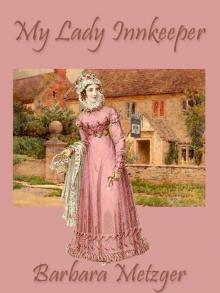 My Lady Innkeeper
My Lady Innkeeper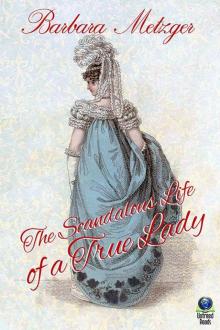 The Scandalous Life of a True Lady
The Scandalous Life of a True Lady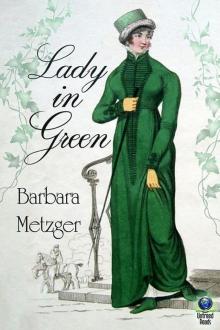 Lady in Green
Lady in Green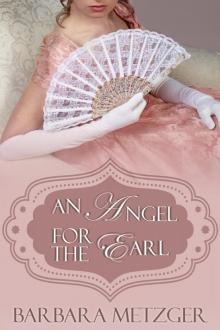 An Angel for the Earl
An Angel for the Earl Truly Yours
Truly Yours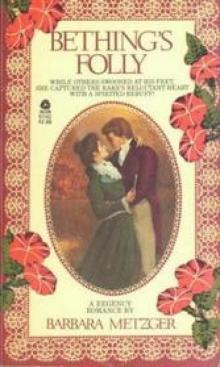 Bething's Folly
Bething's Folly The Christmas Carrolls
The Christmas Carrolls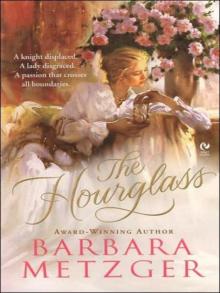 The Hourglass
The Hourglass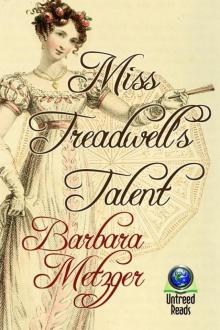 Miss Treadwell's Talent
Miss Treadwell's Talent A Loyal Companion
A Loyal Companion Love, Louisa
Love, Louisa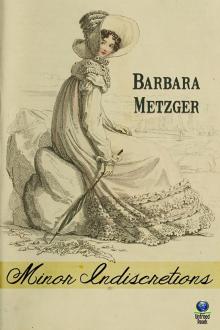 Minor Indiscretions
Minor Indiscretions Jack of Clubs
Jack of Clubs An Enchanted Christmas
An Enchanted Christmas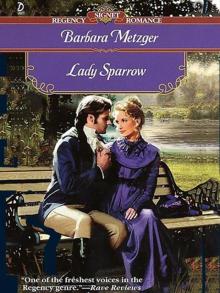 Lady Sparrow
Lady Sparrow Miss Westlake's Windfall
Miss Westlake's Windfall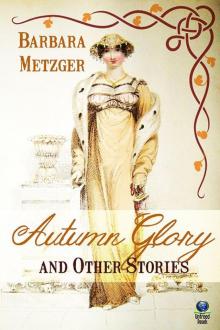 Autumn Glory and Other Stories
Autumn Glory and Other Stories Greetings of the Season and Other Stories
Greetings of the Season and Other Stories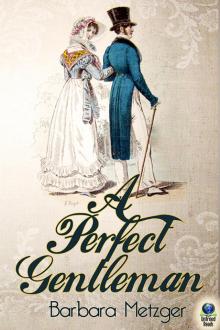 A Perfect Gentleman
A Perfect Gentleman